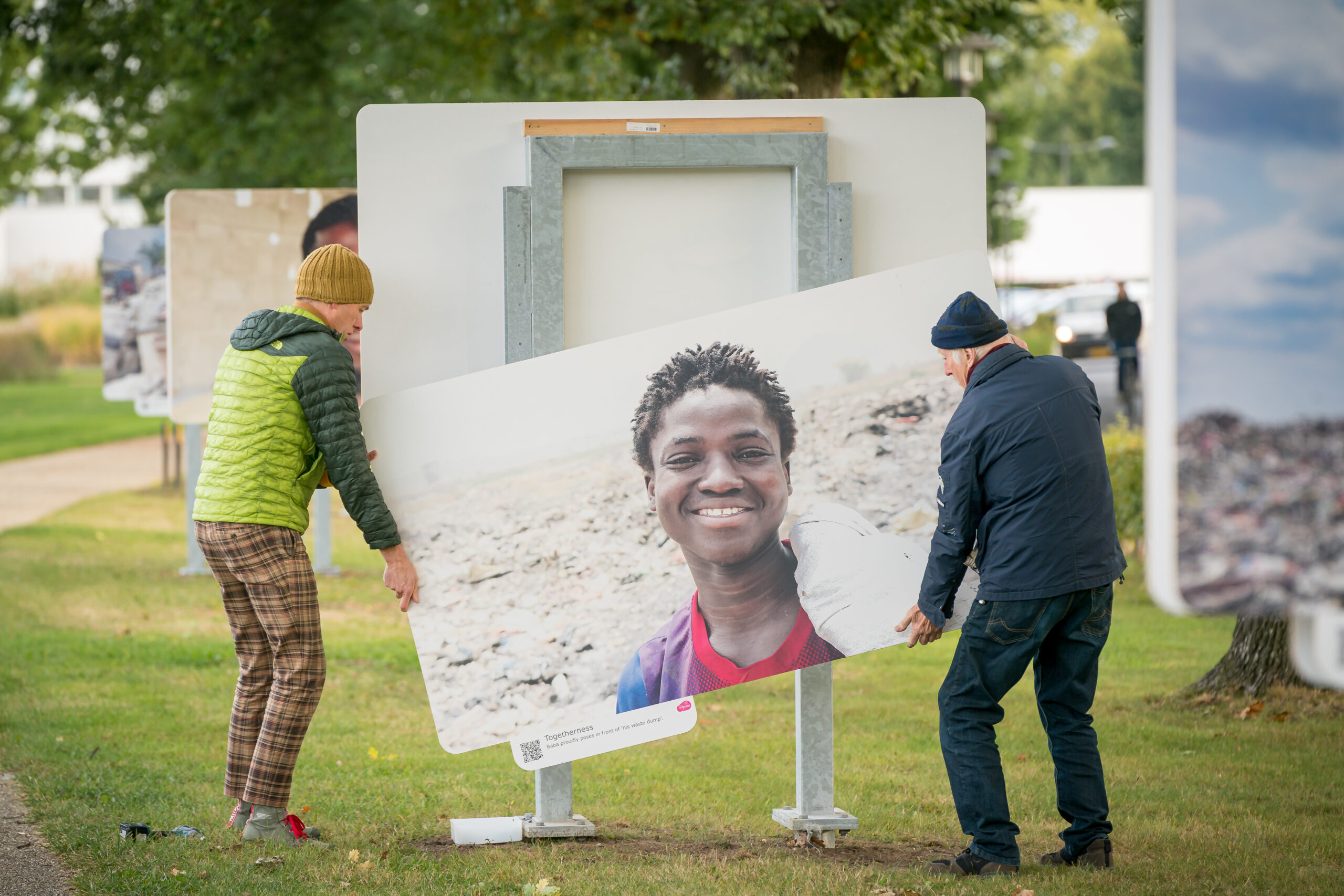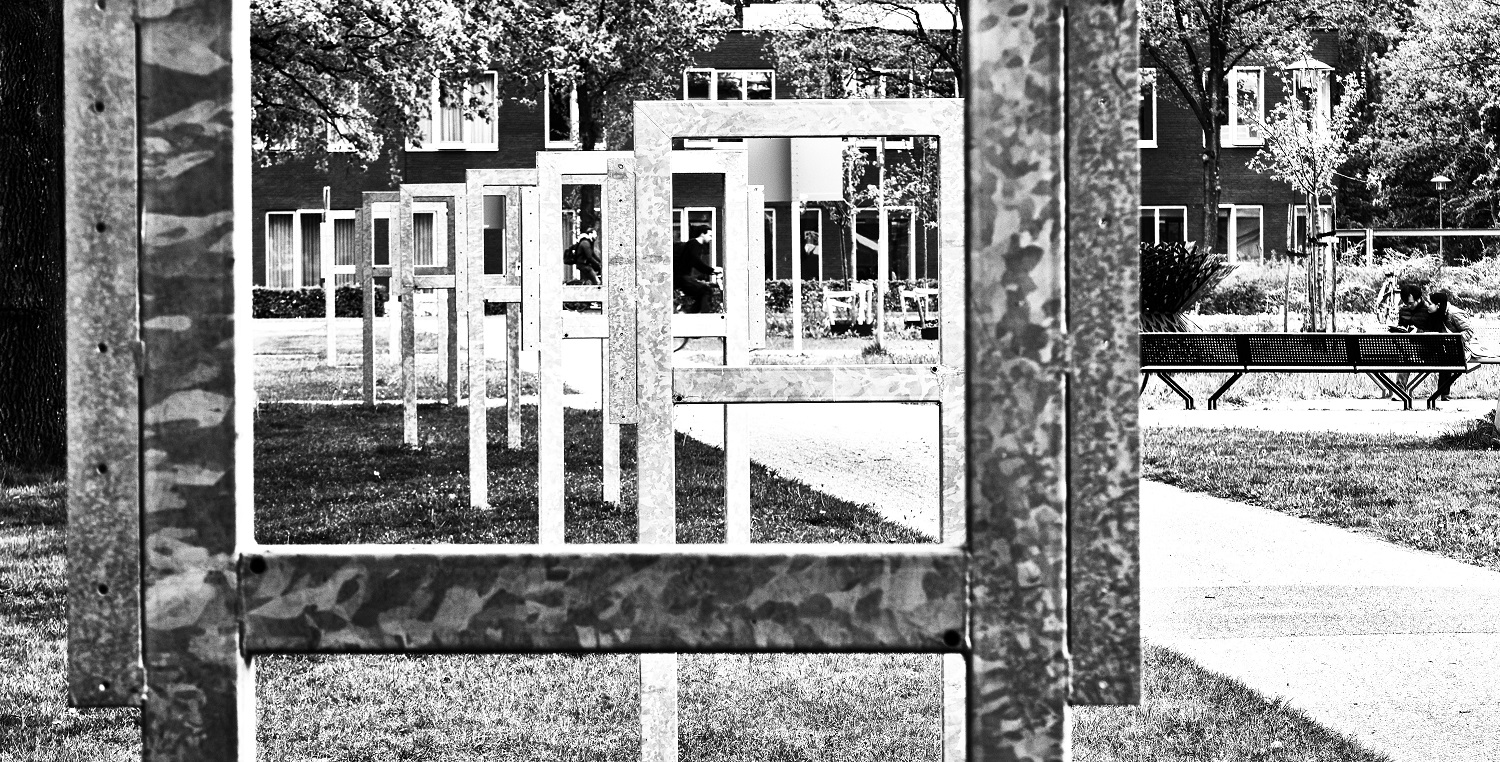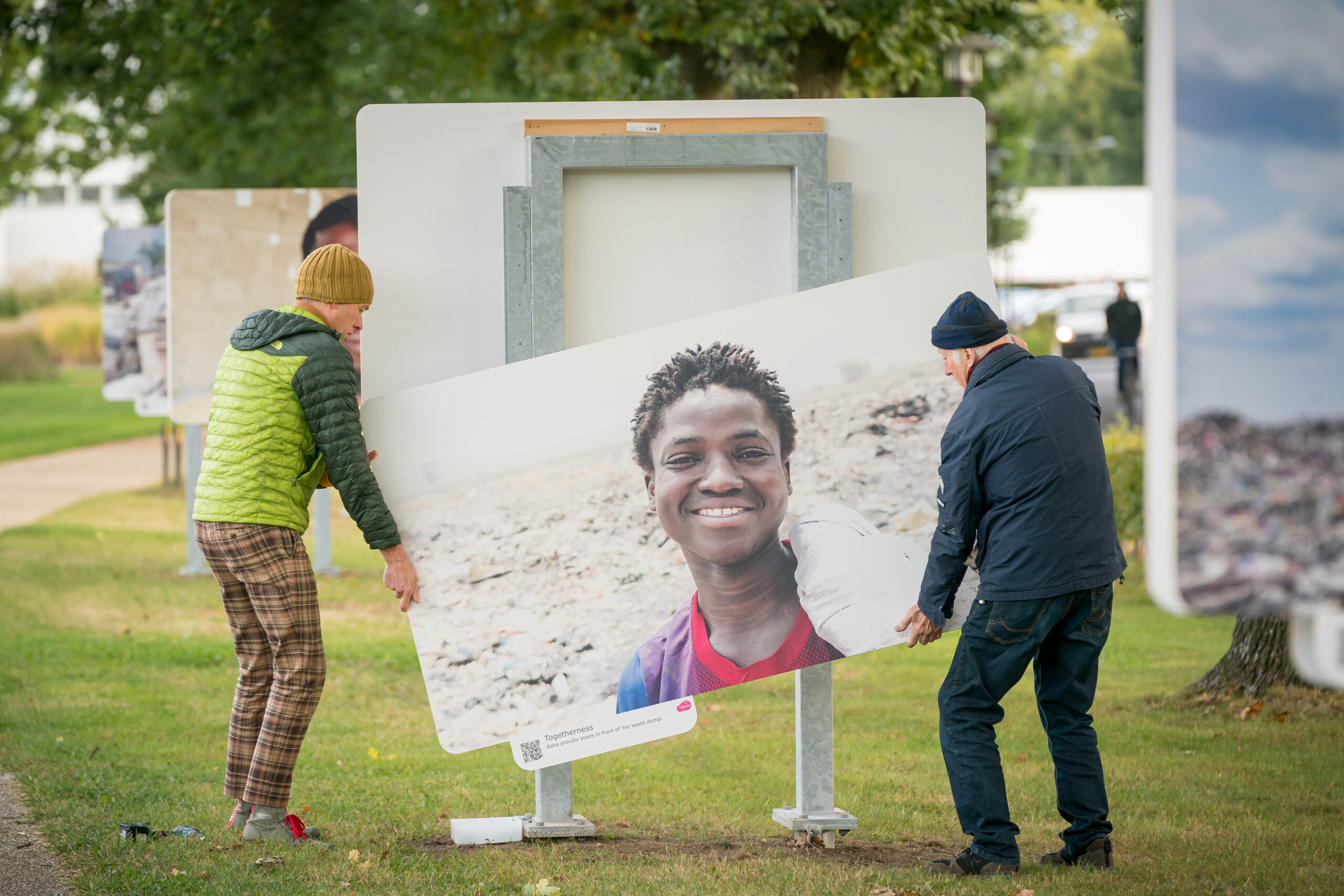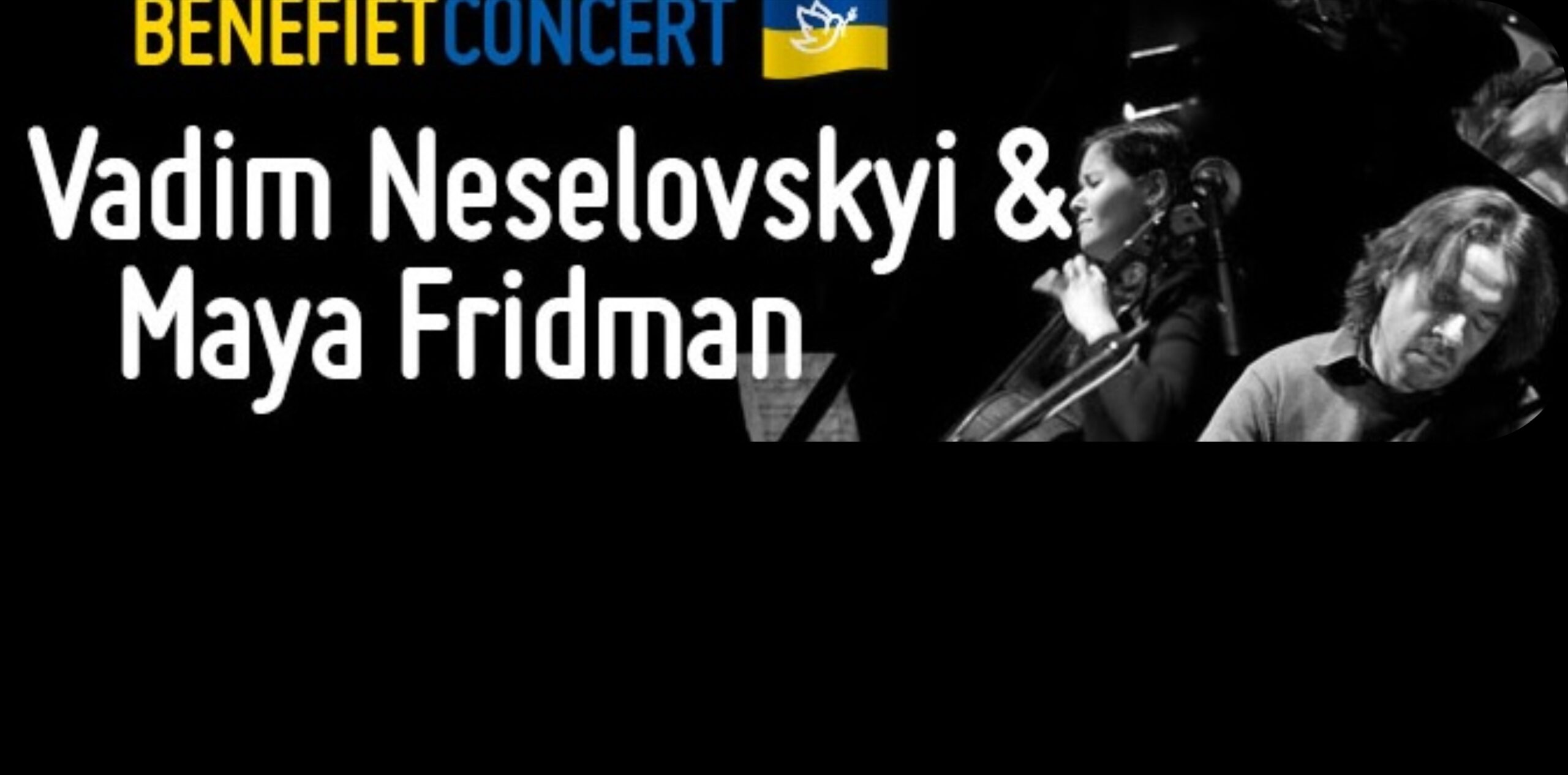This decision was taken following severe criticism from the United Community of African Students (UCAS). UCAS originally demanded the photographs be removed from campus and destroyed. In dialogues between UCAS, the photographer and university representatives, it was decided the exhibition would be temporarily removed. It will be restored with additional contextual information in the near future.
Confronting
The Power of the Wasted exhibition was created by Jurrian Veldhuizen, an alumnus of International Development Studies. Veldhuizen: ‘When I found myself standing on one of Africa’s largest landfills, I wanted people to see it.’ Veldhuizen aims to confront the audience with the ‘gigantic amount of waste we produce every day’ and show ‘the world beyond the trash can.’
It is not sufficiently clear that this is a work of art, rather than scientific research
Sebastiaan Berendse, director of Value Creatione
UCAS criticised, among other things, the use of the word ‘scavengers’, a word used to describe people who informally process waste. According to UCAS, this is a derogatory and demeaning term. A photograph of someone smoking a joint after work is also considered problematic. Moreover, UCAS feels that the photo exhibit is not in compliance with the ethical guidelines for scientific research.
Diligent
‘It is not sufficiently clear that this is a work of art, rather than scientific research’, says Sebastiaan Berendse, director of Value Creation, the team under which Impulse resides. ‘This means that we, as a university, must be more diligent in how we introduce this type of exposition and how we present the context. Following the discussions, we have decided to postpone the exhibit to address the unrest and have a broader dialogue on these sensitivities. Following that, the unabridged exhibition will be restored.’
The university asked my permission to exhibit the pictures. They were aware of the content
Jurrian Veldhuizen, alumnus International Development Studies
If the plan is to fully restore the original exhibition, what is the point of removing it temporarily? ‘A part of the African community feels misrepresented by the exhibit. This has generated emotions. They perceive something different in the pictures than that which the photographer wants to convey. I feel it is worthwhile to address the current tensions by postponing the exhibition. That will allow us to focus on the discussions. That is exactly what Impulse does: inspire and spark dialogue.’
Veldhuizen says he is open to a dialogue on the content but feels that what happens with the exhibition is up to the university and UCAS. ‘The university asked my permission to exhibit the pictures. They were aware of the content.’

 The exhibition was taken down on Friday at 9 a.m.. Photo Sven Menschel
The exhibition was taken down on Friday at 9 a.m.. Photo Sven Menschel 


Dear Luuk Zegers,
It is very unfortunate that you demonstrate this high level of deception and insensitivity to issues that affect other people. I am Chisom Ruby Udeh, the President of the Community of African Students (UCAS). You invited UCAS to get our side of the story which we accepted even though we could have turned down your invitation. I discussed with you and two other members of my team. We had requested to see what you want to publish, you sent it and we made our contributions. Yet, you came out and published your own version of the story.
UCAS is wondering why you reached out to us when you already made up your mind on what to publish?
UCAS understands that Jurrian Veldhuizen is a young man who is at the beginning of his career and very passionate about that. UCAS appreciates his interest in Africa and equally commends IMPULSE in its effort to stimulate discussion around issues.
We however know that stimulating discussion is much better than inciting people. The exhibition of IMPULSE is demeaning and inciting. UCAS had an interaction with Jurrian Veldhuizen, during which he admitted breaches in the process leading the exhibition.
Based on those breaches, UCAS had therefore demanded the exhibitions be pulled down until those issues are clarified and cleared.
Some of the breaches borders on cultural misrepresentations.
While we admit that different meanings could be attached to different images, we know that stories and meanings Jurrian attributed to his photo exhibition do not apply in the context of his photographic research context (Kumasi-Ghana).
Jurrian Veldhuizen has showed the photo of a minor smoking. African does not promote smoking among minors, it is illegal and abhorred. The QR code of this child reads that he does not want his father’s friends to know he was doing a work which is considered illegal in Ghana. Yet, Jurrian made an image of this child, violating his right to privacy and deprived him of the protection he needs as a child. These are just some of the cultural misrepresentations for which UCAS demanded that the exhibition be pulled down.
UCAS also raised some legal and ethical issues which Jurrian admitted to have violated during our first interaction with him. In its graciousness and sense of homeliness, UCAS does not want to throw this up too high. This is because WUR is a home for UCAS and no sensible person breaks its own home. We expect a family discussion with WUR on this which is still in process.
Kindly note that Jurrian Veldhuizen is putting the African images of his exhibition on sale on his website. This worrisome to UCAS.
To the University Community
We (UCAS) would want the university community to understand that this is not a war for us.
We have constituted a team to join in co-creating the contents to represent what Africa truly stands for in this exhibition together with IMPULSE/WUR and the DARE project.
We want stories on and about Africa to be told from the African perspective. We want the process of getting any kind of data (including pictorial data) from Africa to be legally transparent and consistent with ethics of practice. This will be scholarly advantageous for Jurrian who is at the start of his career, to WUR as a great institution, and to Africa as co-creators of knowledge on its lived experience.
So Luuk, if you think playing a game of deception is this matter is more important to you, it is very irrelevant to UCAS and you may want to have a second thought.
Thank you.
Thank you, Chisom Udeh, for your comments to this article, as I found the original severely lacking in context.